Critics Fear Ohio Bill May Allow Students' Religious Beliefs To Trump Facts
Ohio’s state House of Representatives has passed a bill that some critics fear could require teachers to accept faith-based answers on school assignments ― even if those responses are contradicted by scientific facts.
The Ohio Student Religious Liberties Act of 2019, which passed the state House 61-31 on Wednesday, generally seeks to protect public school students’ right to express their faith on school grounds. But one controversial aspect of the proposed legislation is receiving scrutiny for dictating that schools can’t “penalize or reward a student based on the religious content of a student’s work.”
The bill states that Ohio public schools must allow students to engage in religious expression while completing homework, artwork and other assignments. It also says that student’s grades for these assignments will be calculated “using ordinary academic standards of substance and relevance, including any legitimate pedagogical concerns.”
How exactly this grading standard will be applied remains open to interpretation, experts say, which has set off significant debate among Ohio lawmakers and advocacy groups.
Ohio House Minority Leader Emilia Strong Sykes claims the bill would technically allow students in social studies or science classes to refer to Bible stories (such as Noah and the Ark) as true historical events, or to characters from scripture (such as Adam and Eve) as real, historical figures. The bill mandates that educators must not penalize “religious responses that fly in the face of science and accepted facts,” Sykes said.
“As the bill is currently written, it requires teachers to accept answers that could be scientifically inaccurate so long as religious doctrine says they are true,” Sykes told HuffPost in a statement. “A K-12 public school education is intended to open minds and allow free thought, however we are wading in dangerous territory if we refuse to accept facts and science in educational settings.”
The American Civil Liberties Union of Ohio’s chief lobbyist, Gary Daniels, said that his organization fully supports protecting public school students’ religious liberty. But he believes that this particular bill is unnecessary since these rights are already protected by the First Amendment and Ohio’s constitution.
Daniels said he is also concerned about another part of the bill that mandates that public school students may engage in religious expression “in the same manner and to the same extent” that students are permitted to engage in secular expression.
Hypothetically, Daniels said, this could mean that if one set of students organizes a school assembly about suicide prevention that focuses on best practices from a clinical perspective, the school would also need to allow religious students to hold an assembly that teaches the answer to suicide prevention is getting right with God.
“At minimum, this bill is going to confuse administrators and students and in the worst case, it’s going to cause constitutional violations,” Daniels said.
But the bill’s Republican sponsor, Rep. Timothy Ginter, is insisting that the criticism his proposal is getting stems from overblown “urban myths.” In a statement sent to HuffPost, Ginter said that his bill will not allow students to submit inaccurate classwork in the name of religion.
For example, he said that if a class is being tested on the theory of evolution, all students must show that they understand the subject as it was taught.
“A student would still not be allowed to say, “My religion tells me that the world was created and is only 6,000 years old, therefore I don’t have to answer this question,’” Ginter said.
On the other hand, if students are asked to write a book report on any book of their choosing, the bill would make sure students aren’t penalized for choosing to write a book report on the Bible’s Book of Job, Ginter said.
HuffPost requested examples of situations in which the bill would create greater religious freedom for students in science or in history classes but did not receive a response from Ginter’s office.
Ginter said that his bill is necessary because of increased pressure on schools from groups that he claims are “biased against Ohio students’ religious freedoms.”
“Many school officials are confused and frankly, intimidated by the threat of litigation from these well-funded groups,” Ginter said.
Yet whatever Ginter’s intentions with the legislation, “the plain language of the bill is what a court is going to look at,” Daniels said. “Taken alone in that context, the language is too broad and too vague.”
As written, the statute could protect a student’s right to discuss creationism in a science assignment on evolution, according to Caroline Mala Corbin, a law professor at the University of Miami who specializes in the First Amendment’s speech and religion clauses. But it could also allow a biology teacher to refuse to credit a creationism-based answer to a question about evolution — not because the answer is religious, but because under “ordinary academic standards,” the answer is wrong, and under “ordinary academic standards,” teachers do not give points for wrong answers.
How the bill will be interpreted in courts ultimately hinges on what counts as “ordinary academic standards of substance and relevance” and what counts as “legitimate pedagogical concerns.”
“And, of course, how these key parts of the statute are interpreted will depend on who is interpreting them,” Corbin said.
The bill is being sent to Ohio’s Republican-controlled Senate for consideration.
Also on HuffPost
Galileo Galilei (1564 - 1642)
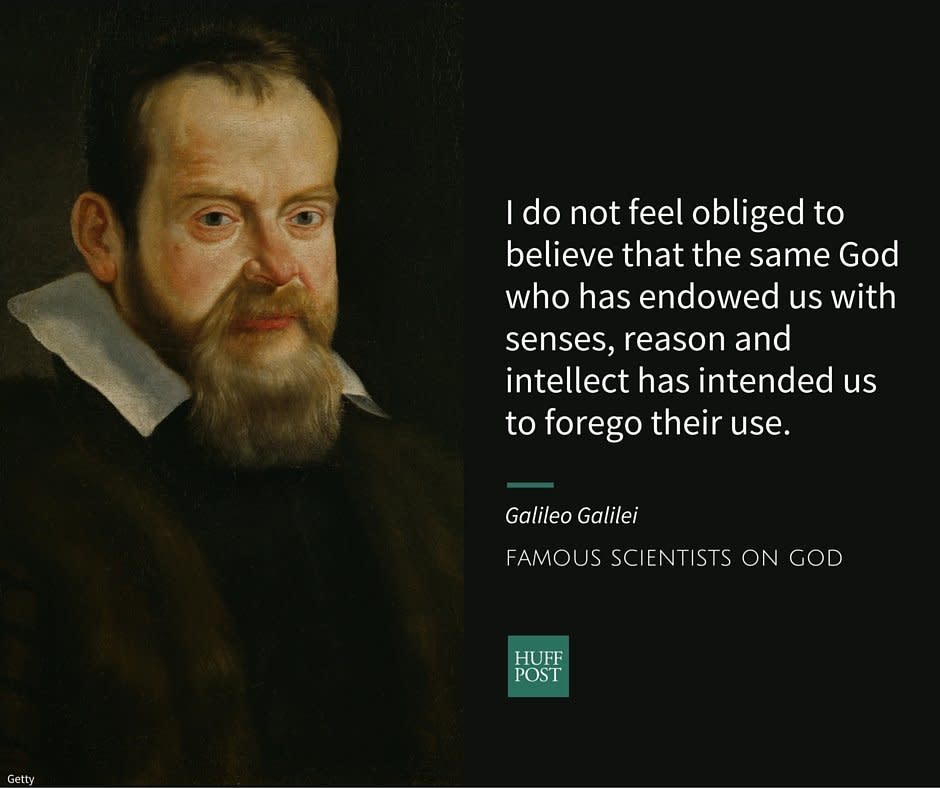
Writing to the Grand Duchess Christina of Tuscany, Galileo criticized philosophers of his time who blindly valued Biblical authority over scientific evidence.
"I do not feel obliged to believe that the same God who has endowed us with senses, reason and intellect has intended us to forego their use and by some other means to give us knowledge which we can attain by them. He would not require us to deny sense and reason in physical matters which are set before our eyes and minds by direct experience or necessary demonstrations."
Sir Francis Bacon (1561 - 1626)
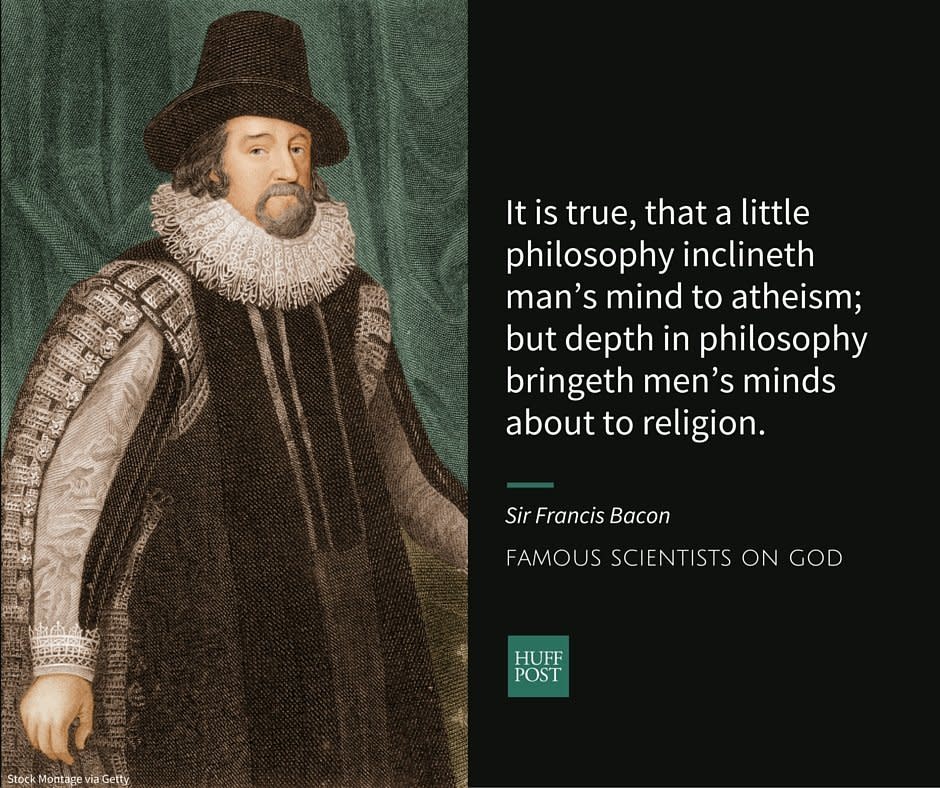
In an essay on atheism, Bacon wrote:
"God never wrought miracle to convince atheism, because his ordinary works convince it. It is true, that a little philosophy inclineth man’s mind to atheism; but depth in philosophy bringeth men’s minds about to religion. For while the mind of man looketh upon second causes scattered, it may sometimes rest in them, and go no further; but when it beholdeth the chain of them, confederate and linked together, it must needs fly to Providence and Deity."
Charles Darwin (1809 - 1882)

In an 1873 letter to Dutch writer Nicolaas Dirk Doedes, Darwin wrote:
"I may say that the impossibility of conceiving that this grand and wondrous universe, with our conscious selves, arose through chance, seems to me the chief argument for the existence of God; but whether this is an argument of real value, I have never been able to decide. I am aware that if we admit a first cause, the mind still craves to know whence it came and how it arose. Nor can I overlook the difficulty from the immense amount of suffering through the world. I am, also, induced to defer to a certain extent to the judgment of the many able men who have fully believed in God; but here again I see how poor an argument this is. The safest conclusion seems to be that the whole subject is beyond the scope of man's intellect; but man can do his duty."
Maria Mitchell (1818 - 1889)

After hearing a minister preach about the dangers of science, Mitchell wrote:
"Scientific investigations, pushed on and on, will reveal new ways in which God works, and bring us deeper revelations of the wholly unknown."
Marie Curie (1867 - 1934)
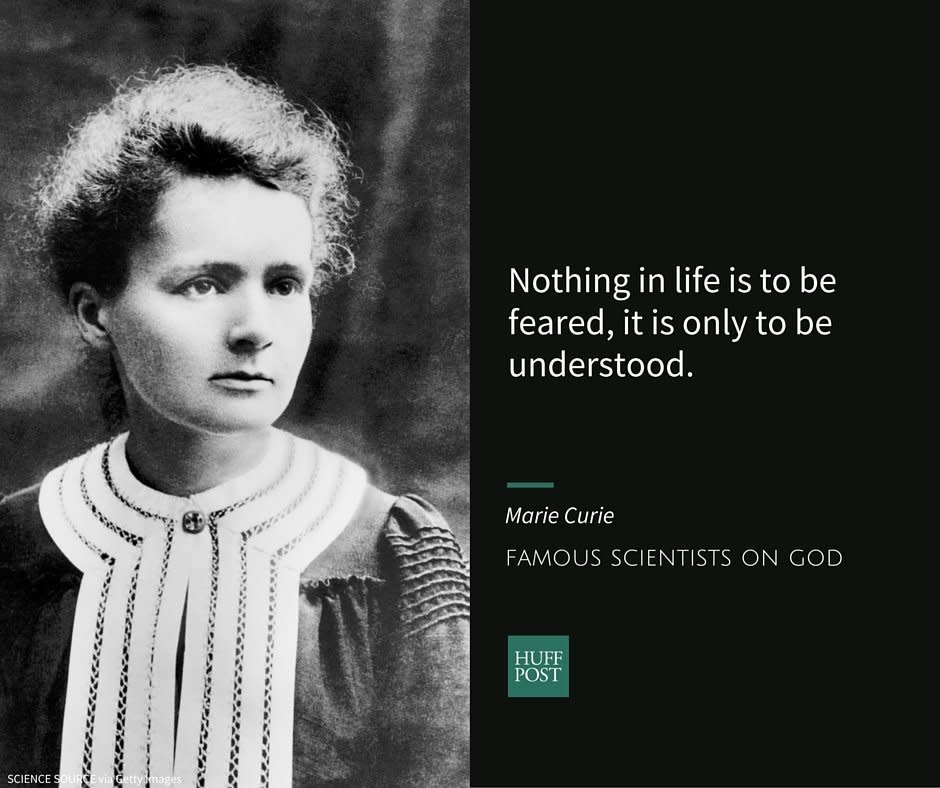
She is quoted as saying:
"Nothing in life is to be feared, it is only to be understood. Now is the time to understand more, so that we may fear less."
Albert Einstein (1879 - 1955)
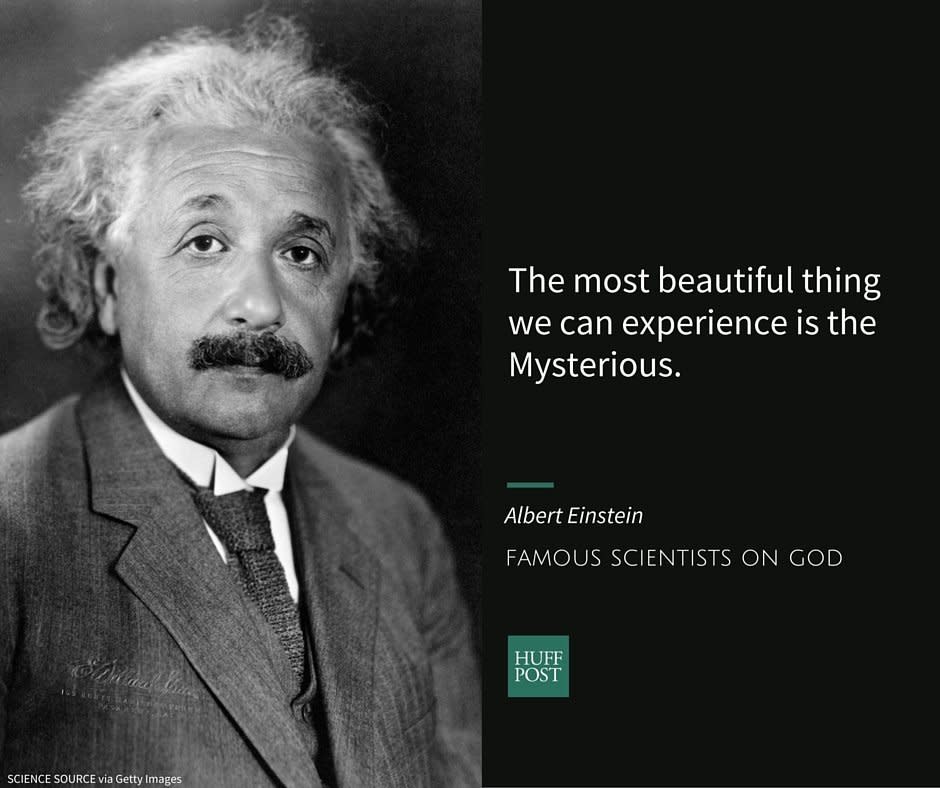
In a 1954 essay for NPR, Einstein wrote:
"The most beautiful thing we can experience is the Mysterious — the knowledge of the existence of something unfathomable to us, the manifestation of the most profound reason coupled with the most brilliant beauty. I cannot imagine a God who rewards and punishes the objects of his creation, or who has a will of the kind we experience in ourselves. I am satisfied with the mystery of life's eternity and with the awareness of — and glimpse into — the marvelous construction of the existing world together with the steadfast determination to comprehend a portion, be it ever so tiny, of the reason that manifests itself in nature. This is the basics of cosmic religiosity, and it appears to me that the most important function of art and science is to awaken this feeling among the receptive and keep it alive."
Rosalind Franklin (1920 - 1958)
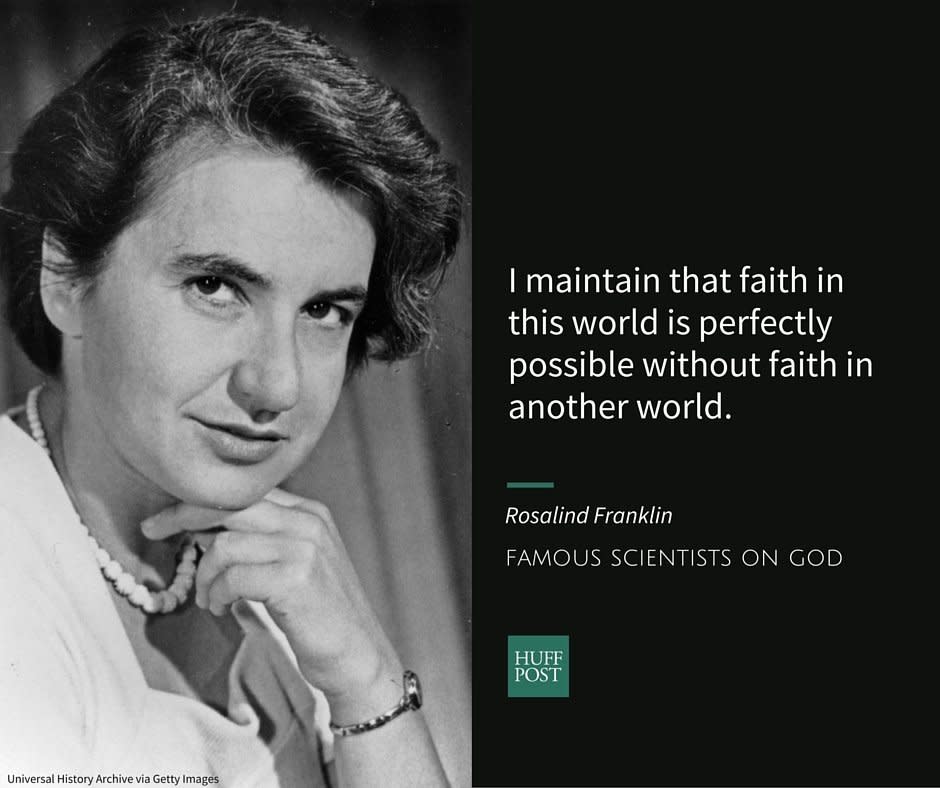
When her father accused her of making science her religion, Franklin told him that she had a different definition of faith:
"In my view, all that is necessary for faith is the belief that by doing our best we shall come nearer to success and that success in our aims (the improvement of the lot of mankind, present and future) is worth attaining. Anyone able to believe in all that religion implies obviously must have such faith, but I maintain that faith in this world is perfectly possible without faith in another world...I see no reason to believe that a creator of protoplasm or primeval matter, if such there be, has any reason to be interested in our insignificant race in a tiny corner of the universe, and still less in us, as still more insignificant individuals."
Carl Sagan (1934 - 1996)
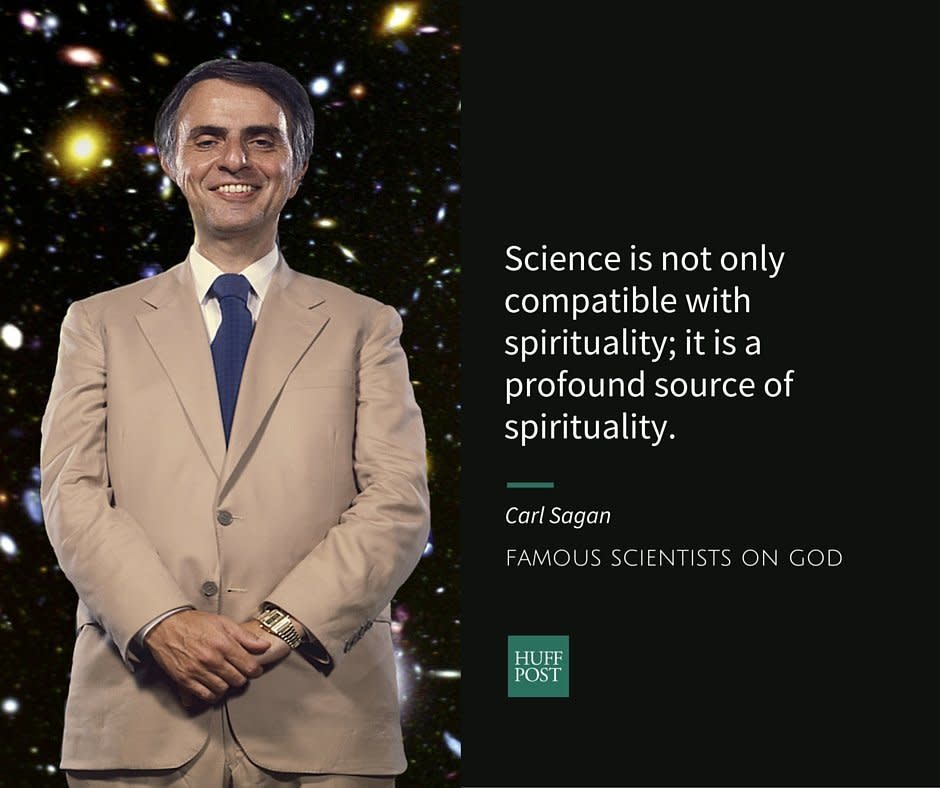
In his book, The Demon-Haunted World: Science as a Candle in the Dark, Sagan writes:
"Science is not only compatible with spirituality; it is a profound source of spirituality. When we recognize our place in an immensity of light years and in the passage of ages, when we grasp the intricacy, beauty and subtlety of life, then that soaring feeling, that sense of elation and humility combined, is surely spiritual."
Stephen Hawking (Born 1942)
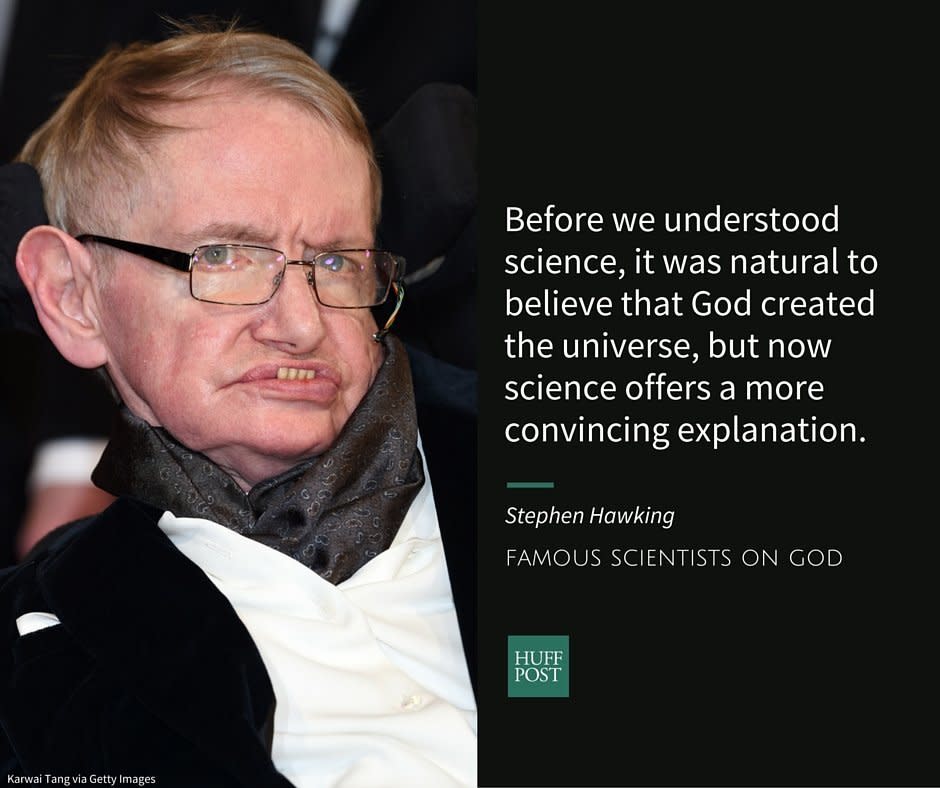
In an interview with the Spanish newspaper El Mundo, Hawking said:
"Before we understood science, it was natural to believe that God created the universe, but now science offers a more convincing explanation."
Venkatraman Ramakrishnan (Born 1952)

In an interview with the Hindustan Times, he said:
"There is no scientific basis for how movement of planets and stars can influence our fate. There is no reason for time of birth to influence events years later. The predictions made are either obvious or shown to be random ... A culture based on superstitions will do worse than one based on scientific knowledge and rational thoughts.”
Neil deGrasse Tyson (Born 1958)
![Neil deGrasse Tyson is an astrophysicist and a popular television science expert. He told The Huffington Post thathe isn't convinced by religious arguments about the existence of a "Judeo-Christian" god that is all-powerful and all-good, especially when he observes the death and suffering caused by natural disasters. Still, he told <a href="http://bigthink.com/think-tank/neil-degrasse-tyson-atheist-or-agnostic" target="_blank">Big Think</a> that while he's often "claimed by atheists," he's actually more of an agnostic.<br /><br />In<a href="http://www.haydenplanetarium.org/tyson/buy/books/death-by-black-hole" target="_blank"> <i>Death By Black Hole</i>,</a> a collection of science essays, Tyson <a href="http://www.haydenplanetarium.org/tyson/read/quotes-by-neil-degrasse-tyson/science-quotes" target="_blank">writes</a>:<br /><br /><i>"So you're made of detritus [from exploded stars]. Get over it. Or better yet, celebrate it. After all, what nobler thought can one cherish than that the universe lives within us all?"</i>](https://s.yimg.com/ny/api/res/1.2/qlaboucbO291SgzEDF69cA--/YXBwaWQ9aGlnaGxhbmRlcjt3PTk2MA--/https://img.huffingtonpost.com/asset/56b0ef5b1800002d0080b1b9.jpg)
In Death By Black Hole, a collection of science essays, Tyson writes:
"So you're made of detritus [from exploded stars]. Get over it. Or better yet, celebrate it. After all, what nobler thought can one cherish than that the universe lives within us all?"
Francis Collins (Born 1950)
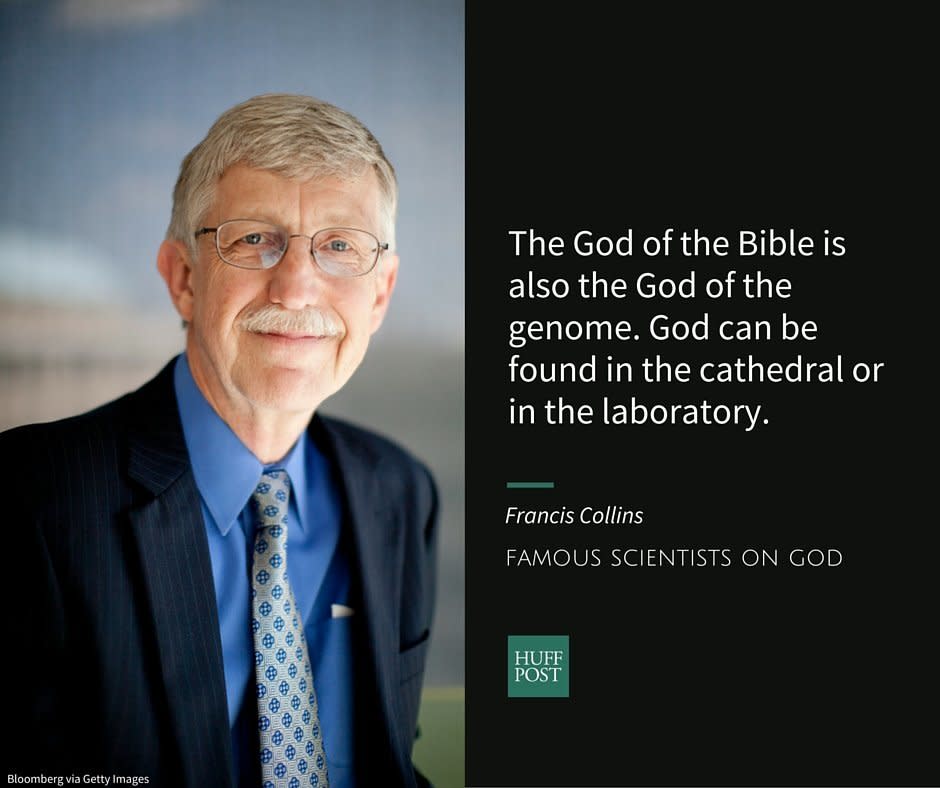
In an essay for CNN, Collins writes:
"I have found there is a wonderful harmony in the complementary truths of science and faith. The God of the Bible is also the God of the genome. God can be found in the cathedral or in the laboratory. By investigating God's majestic and awesome creation, science can actually be a means of worship."
Love HuffPost? Become a founding member of HuffPost Plus today.
This article originally appeared on HuffPost.

